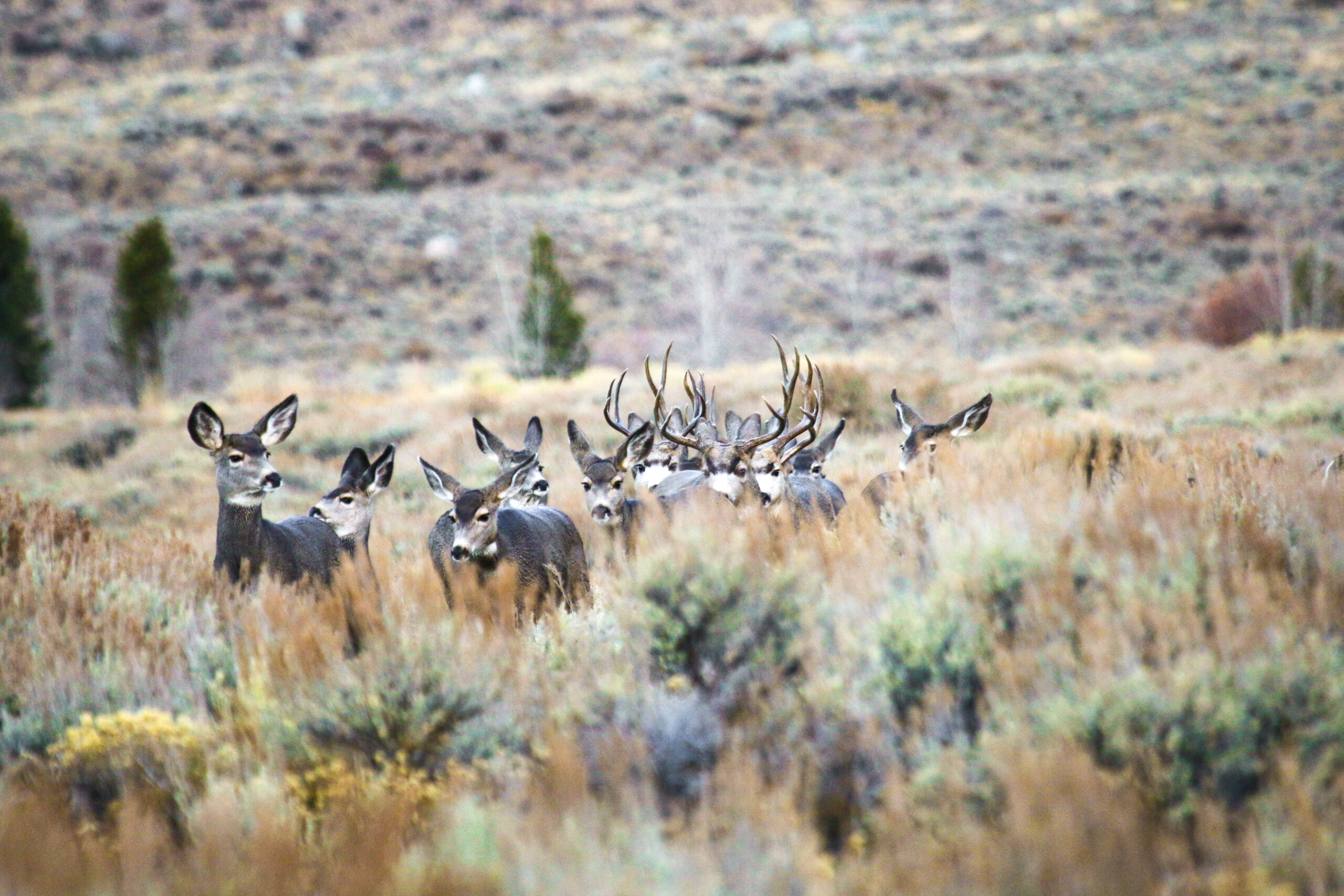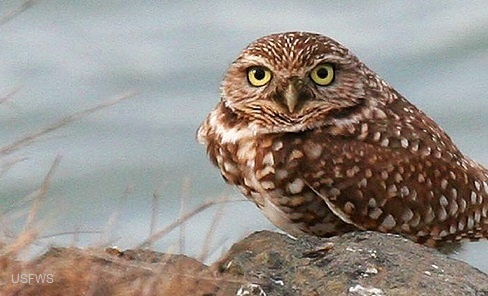Women in Hunting and Fishing: Artemis
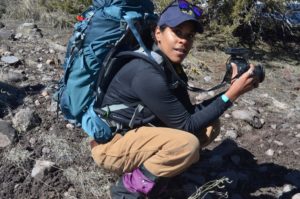
Women are the fastest growing demographic in hunting and fishing. They enter the field with a deep appreciation of our heritage and a passion to care for the wildlife and habitat of which we all are a part. Artemis, named after the Greek Goddess of the hunt and wild animals, is a National Wildlife Federation initiative that supports and fosters this passion. Artemis sets examples of ethical hunting and angling. We break stereotypes, open dialogue and include new, diverse voices in the hunting and angling communities. Artemis brings together bold and passionate sportswomen, who work diligently to protect America’s 640 million acres of public lands and mentors them to become effective advocates for conservation at the local, state and national level.

Crystal Egli. Credit: Maddy Kuhl
Our public lands provide the necessary habitat for the health and connectivity of America’s robust wildlife. Those lands are under stress from increasing human population, expanding industries and infrastructures, and the continued push for energy dominance and resource extraction. With these new and unprecedented attacks on public lands, there is a dire need to reinvent and reinvigorate the conservation movement, enlist a new and modernized conservation coalition and implement creative new ways to speak to both decision makers and the public. Sportswomen are a integral and powerful voice in this coalition.
During Women’s History Month, Artemis is honoring women who dedicate their time and attention to advocating for public lands and sharing their stories with others. Their stories – like our own – are connected to a deep history of our relationship to the natural world and the people who influence our connection to it.
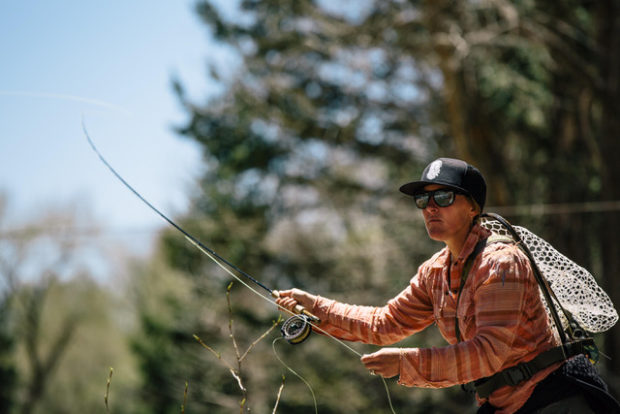
A woman fishing in the Sawtooth National Recreation Area. Credit: Becca Aceto
Artemis’ own conservation ethos is strongly influenced by Native American stories, which bestow the importance of a reciprocal relationship with the earth and honor our obligation to care for it. Dr. Robin Wall Kimmerer is the founding Director of the Center for Native Peoples and the Environment. Their mission is to create programs which draw on the wisdom of both indigenous and scientific knowledge for our shared goals of sustainability. Dr. Kimmerer’s book, Braiding Sweetgrass: Indigenous Wisdom, Scientific Knowledge and the Teachings of Plants, is a collection of essays, each of which weaves together beliefs and practices of Native people, Dr. Kimmerer’s scientific knowledge of the natural world, and stories from her life. The result is a poetic elucidation of our need to restore our relationship with the natural world. That restoration requires a sense of reciprocity. We have an obligation to give as well as receive.
“If an animal gives its life to feed me, I am in turn bound to support its life. If I receive a stream’s gift of pure water, then I am responsible for returning a gift in kind. An integral part of a human’s education is to know those duties and how to perform them.” – Dr. Robin Wall Kimmerer, Braiding Sweetgrass: Indigenous Wisdom, Scientific Knowledge and the Teachings of Plants
Artemis takes this obligation to heart and upholds the definition of a complete sportswoman – one who can skin a deer, land a burly brown trout, navigate the backcountry, and she knows her game commissioners and politicians, knows wildlife laws, defends all wildlife, advocates on their behalf and teaches others these skills.
Here are four Artemis women who are building on the stories of our past and making waves in hunting, angling, and conservation communities across the country. The stories they share work to inform, educate and conserve our public lands and wildlife heritage for generations to come.
Cindy Stites

Credit: Cindy Stites
Cindy is a Manager of Commercial Landscape Construction in Coatesville, Indiana. She has been hunting for 6 ½ years and fishing for most of her life. She is an Artemis Sportswoman, a Hunt to Eat Ambassador, an Indiana Hunters Education Instructor, a 4H Shooting Sports Archery Instructor, a Board Member for the Indiana chapter of Backcountry Hunters and Anglers, and a Regional Committee Member for 2% for Conservation. She writes a blog called Whitetails and Running Trails, where she shares her journey with the sporting community. Cindy has been a strident advocate for the recently signed “John D. Dingell, Jr. Conservation, Management, and Recreation Act” and the Land and Water Conservation Fund (LWCF). She is now turning her energy to advocating for full funding for LWCF.
“For me, the spark for conservation was really ignited once I started hunting. I started appreciating the land and the animals in a more up close and personal way. You cannot keep taking without giving something back. As hunters, there is so much more that we can do to give back to the animals.”
Stine Richvoldsen

Credit: Stine Richvoldsen
Stine is a software developer in Jackson, Wyoming. She started fishing as a kid with her grandpa in Norway and started fly fishing 5 years ago. Stine first ventured into hunting by accompanying her husband, and then started hunting herself when she picked up a bow and discovered archery. She heads into the mountains every September and hunts mostly
solo. When rifle season starts, she once again enters the woods with her husband. She says, “I’ve always done most of my recreating on public lands, whether it’s running, climbing, biking, or hiking. Because of that, I’ve been excited to preserve our wild spaces. When hunting or fishing, you’re PART OF your environment, not just IN it. It really highlights the importance of taking responsibility for maintaining and caring for the landscape you’re part of. It’s no longer just about maintaining the relatively small areas we use for recreation; we need to consider entire habitats that sometimes stretch across states to support their quarry.”
Stine is an Artemis Sportswoman and a Conservation Ambassador for the Wyoming Wildlife Federation. She recently wrote a blog about the importance of sharing your knowledge and passion with legislators for Wyoming Wildlife Federation called The Power of Showing Up after attending Camo at the Capitol in Cheyenne, WY, a program that brings hunters and anglers together for advocacy training.
“I feel like a LOT can be done just by talking to people, especially respectful conversations with people of differing opinions. I also take pride in being a supporter of other sportswomen and wildlife enthusiasts whether that is sharing archery form tips at 3D league, making sure my friends know about educational events, or encouraging fellow sportswomen to take charge of their own experience. I think it’s important that we as women encourage each other, and affirm that we can achieve our aspirations on our own.”
Chelsea Cassens
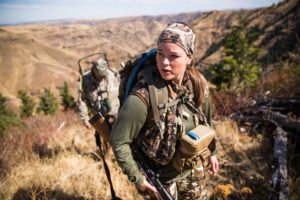
Chelsea Cassens hunts for elk on the Nature Conservancy’s Zumwalt Prairie Preserve. Credit: Max Whittaker for The New York Times
Chelsea was born and raised in Eastern Oregon where she spent much of her time on public lands and wild places. She is a nurse and a mother of two. Her passion for public lands comes from her parents and grandparents, who exposed her to the beauty of the outdoors and built memories to last a lifetime. Chelsea hunts big game and upland birds in the fall. During the winter, you can find her chasing waterfowl and steelhead fishing. In spring and summer she enjoys multiple public land activities, from trying to outsmart the elusive Rio Grande turkey, to mushroom and huckleberry picking, to spending time in the woods scouting and camping with friends and family. Hunting and fishing have been a staple for food and nourishment for every generation in her family.
“It’s not always easy to find the time to recreate, advocate, and volunteer while working and raising a family. It’s really important to me, and I have made conservation work a part of my family’s lifestyle.”
Chelsea is the Oregon ambassador for Artemis Sportswomen. Additionally, she is a brand ambassador and Community Manager for Hunt to Eat, First Lite Prostaff member, and secretary and treasurer for Oregon state Chapter of Backcountry Hunters and Anglers. She helped host the 2018 Association of Northwest Steelheaders Women’s Fishing and Outdoors Clinic with Artemis co-founder Jess Johnson. She was also recently featured in two articles published by The New York Times: Poisoned Wildlife and Tainted Meat: Why Hunters Are Moving Away From Lead Bullets and a Times Insider piece A Vegetarian Reporter Explores a Hunting Dilemma, where she unknowingly took a vegetarian writer on her elk hunt.
“I believe that everyone at some level cares for fish and wildlife as well as clean air and clean water. The women in Artemis embody a whole vision of truly becoming committed conservationists. We are here to protect it, and become a strong voice for all.”
Crystal Egli

Photo Credit: Nora Logue
Crystal Egli is a videographer for Colorado Parks and Wildlife. Crystal is an active outdoors-woman, both on and off the job. She enjoys hiking, backpacking, fishing, and hunting, all of which she looks forward to experiencing with her baby daughter. She is a board member for Environmental Learning for Kids. Her hunting journey started a few years ago, but she has been fishing for as long as she can remember. Her dad would take her out and tell her that he wasn’t allowed to touch any of the fishing equipment because he didn’t have a license. So, Crystal would have to figure out how to do it all by herself if she wanted to continue. This included rigging the line, tying knots, baiting the hook, removing fish off the hook, netting. He was always standing close by, but she had to do the work. As an adult, when she called him up to confront him about this, his response was, “I don’t even like fishing. I just thought you might.”
Crystal attributes this self-reliant experience as one of the reasons she started to hunt as an adult. She understands and values the importance of friends and mentors for close guidance, but she makes sure to do each step herself.
“I had people guiding me on what steps to take, but I always made sure to be the one physically doing each step; that was very important to me. It instilled a sense of pride in my own abilities and that pride is what drives me to continue pursuing hunting as a resource for food and fishing as a source of fun.”
We are at a crossroads in the history of American conservation. In order to continue to tell stories that resonate with people across America, we must incorporate more stories. Crystal is a strong voice in this effort. She knows that people of color recreate in the outdoors a lot more than the agencies, media, national hunting and fishing organizations think they do. She is reaching out to people who have documented this history as well as communities of color to attempt to change this.
Learn more about Artemis and sign up to join our network of sportswomen.
The post Women in Hunting and Fishing: Artemis appeared first on The National Wildlife Federation Blog.
Source: Public Lands
Originally Posted on NWF.org



